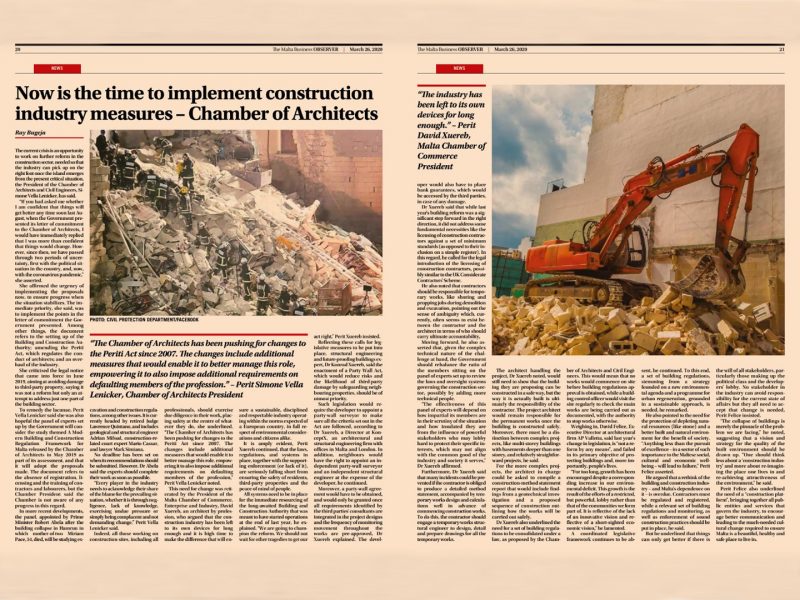
In the latest issue of the Malta Business Observer, architects and local institutions were called to answer questions regarding the need to change the current building regulations. As site accidents and buildings collapses are still making the news, the implementation of new measures has become urgent, said President of Chamber of Architects and Civil Engineer and AP’s Design Director Simone Vella Lenicker. The Chamber proposal would ensure regular site visits conducted by a building control officer and that no works would start on site prior building regulation approval. According to AP’s Executive Director David Felice, the change in legislation – not a reform by any means – failed in its primary objective, that of protecting buildings and, more importantly, people’s lives. The measures taken last year were a reaction to a problem that had been long evolving. Reform in the construction industry is overdue but will need to be tackled from a rounded perspective. For too long, growth has been encouraged despite a corresponding increase in our environmental deficit. This growth is the result of the efforts of a restricted, but powerful, lobby rather than that of the communities we form part of. It is reflective of a
We thrive on the absence of a co-ordinated legislative framework. We urgently need a set of building regulations that stem from a strategy founded on a new environmental agenda and a programme for urban regeneration, grounded in a sustainable approach. There is also the need for a contemporary infrastructure, the protection of depleting natural resources (like stone) and a better built and natural environment for the benefit of all our society. Anything less than the pursuit of excellence – in a sector of such importance to the Maltese social, cultural and economic
It is time – indeed it has been for a long time now – to rethink the building and construction industry and our dependence on it. The first step must be the regulation and registration of contractors. This must be followed by the enaction of a relevant set of building regulations and monitoring and enforcement of sound construction practices. The overall intent will be to reverse the environmental deficit that we have had
Things can get better in a very short time if there is the will from all stakeholders, but especially that of our political class and of the developers’ lobby, to understand that change is necessary. If this does not happen,
The collapse of buildings is merely the pinnacle of the problem we are facing. Certainly, the most serious, but not the only area of risk and danger to the public and the safety of construction workers. One needs to be reminded that there have been other deaths in recent months – mostly of non-Maltese construction workers – that were not the result of the collapse of buildings. While a fresh start based on a new approach will reduce risk, it also needs to address the response to accidents on site and the enforcement
Firstly, to develop a vision and strategy for the quality of our built environment – we need to be thinking less about a ‘construction industry’ and more about re-imagining the place we live in and re-achieving attractiveness of our environment. Secondly, we need to involve all stakeholders to create a legislative framework that addresses the regulation of all the players involved and enact building regulations based on sound research and the
Finally, we need to create a